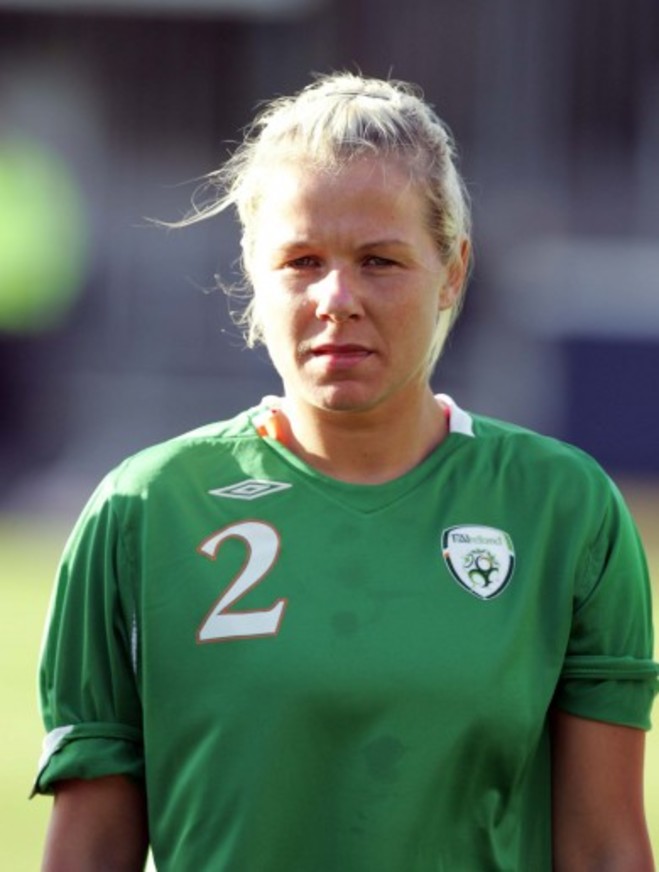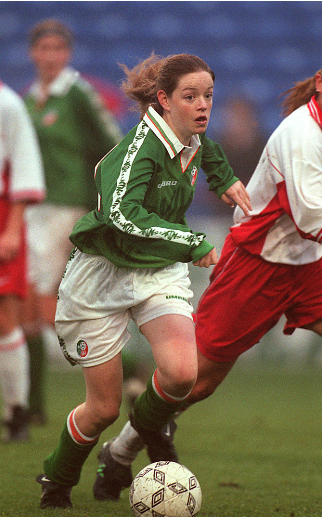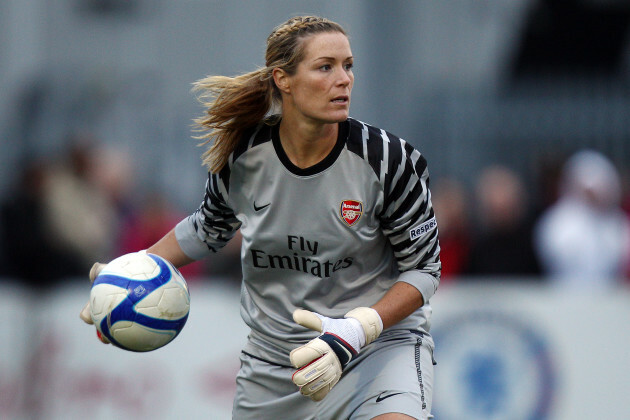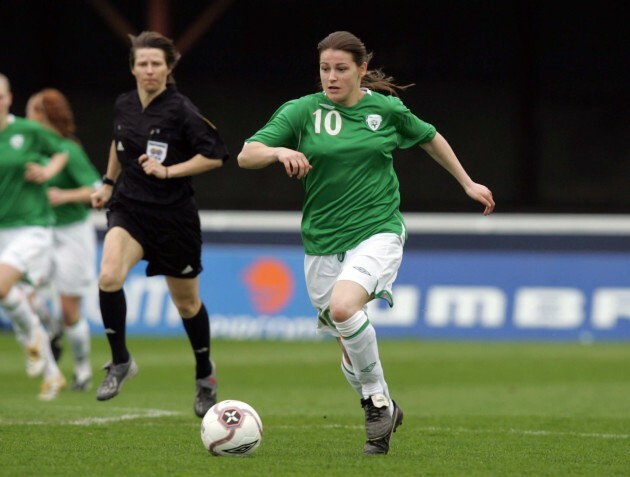SPORT, IN ITS purest form, both for those who watch and play it, is an escape from reality.
“When you’re on the pitch,” Diego Maradona once said. “Everything goes away.”
It is also, of course, a multi-million-euro business, and at the highest level of football in particular, it’s easy for people involved and those on the outside to become cynical and disillusioned with it.
While it has become increasingly commercialised in recent years, these negative feelings are undoubtedly far less commonplace in women’s football.
Unlike what would almost certainly be the case with a 54-times-capped male Irish international, Elaine O’Connor did not retire from football with significant riches, but she still savoured every moment of her time in the game.
For O’Connor, football provided an outlet — it was a major part of her life in the good times and bad. In many ways, she says, it “saved” her.
Yet for the Irish international, there was an ongoing battle in her life between the fantasy of a sustained career in sport and the harshness of reality.
*****
O’Connor grew up in Killinarden, Tallaght, playing with her brother and the lads on the road from an early age.
At 12, she joined the Lourdes Celtic girls team, coached by Tony Sheridan — father of the ex-Shelbourne star of the same name — and Tommy Doolin.
They had great success, winning the Dublin Cup at U14, U16 and U18 and forming an intense rivalry with Clondalkin-based Red Lake.
O’Connor’s performances attracted attention at youth level and ultimately earned her a trial with Ireland U16s.
From then on, the Dubliner rose through the various underage ranks before establishing herself in the senior side, playing alongside the talented likes of Olivia O’Toole, Caroline Thorpe and Claire Scanlan among others.
In addition to Lourdes, O’Connor also had stints with St Catherine’s and Shelbourne. It was while playing for the latter that American coach Joanne Russell saw her in action and opted to recruit the teen to Hofstra University in New York.
“I was marking Sue Ronan for a little trial for the American team,” she tells The42. “Then [Joanne] just asked who would be interested in playing in America. Myself and Sharon Cullen, who was another great player, a Tallaght girl, we both said we would be.
I came over on a little visit at 16 with Sharon, who would have been three or four years older than me. She was brilliant, she took care of me I guess. I was like her little sister.
“It was January, it was cold, the coach took us on a trip around Manhattan into the city and we went up into the Twin Towers. We had an unbelievable weekend in New York at Hofstra. They showed us the ropes, the team, what it would be like and I just fell in love with it, I really did. I ended up signing for them. I finished my Leaving Cert and straight away, I came out.”
O’Connor ended up spending five years in college in the US, majoring in Physical Education, while representing Hofstra Pride, in addition to regularly flying back and forth for Ireland international matches.
“[The FAI] would pay for the flights. They were very good. I know people complain about it a lot, but girls’ sports weren’t big at the time. They took care of us. I know some people say they didn’t really take care of us, but I never had any issues with them. I used to fly everywhere. I’d fly to Greece, Italy, France. The coaches and teachers [in Hofstra], they were very good about it.”
Homesickness was an issue at times, particularly in those early days, even though O’Connor did have Cullen and later, fellow Irish international Dolores Deasley for company in the US.
“I remember going home that first Christmas. I came back then in January, I was like: ‘I don’t want to be here.’ I wanted to have a great Christmas at home. But I always knew the best thing for me was to get my degree. I always knew that I wasn’t going to get a career out of soccer back then. So it always pushed me to come back and get my education and have a career, and do something I’d be able to do for a long time.”
The awful news of two family tragedies in a short space of time also meant a temporary return to Ireland for O’Connor.
“Sadly, in my sophomore year, my sister passed away — she was struggling with cancer.
“I ended up going home for the funeral. I came back to America a few weeks later. I finished out the year. Then that following year, which would have been going into my third year, I was in pre-season in August and I got a phone call. My dad was killed in a car crash. So it was very tough.
“What I ended up doing was I came home for the funeral and while I was home, 9/11 happened. My dad died 31 August, I was home, I was just staying an extra few days. So I ended up staying home a little longer.
When I went back to America, it would have been probably towards the end of September. I only literally stayed for a weekend. I couldn’t handle it. It was too much for me — losing my sister, losing my dad. Within 11 months, I’d lost both of them. But I continued to play for Ireland through it all, which was probably the best thing I did. Soccer kind of kept my mind off things. That would have been a huge thing.”
During this difficult period, football remained a constant in her life and proved a necessary distraction.
“The best time of my life was playing back then. We still talk about all of it. The funny stories, the going out and having drinks after the games.
“I got to travel to so many countries — probably one of the biggest things was to travel.
“We went to Bosnia. We got a tour. We could see the bullet holes in the walls. And because I used to travel home a lot, I got to see my family a lot when I lived in America. I always got the opportunity to go home in between [playing and returning], to surprise my mother and she wouldn’t know.
“She was going through a tough time, losing her daughter and her husband. I’d come home and surprise them sometimes. It probably saved me in ways, going through the grieving. It was definitely a distraction and it pushed me through, soccer.”
O’Connor graduated in 2003 and signed for Arsenal Ladies the following year, rooming with Irish team-mates Emma Byrne and Yvonne Tracy during her time there.
Yet the accomplished midfielder spent just half a season with the Gunners, who were the dominant force in English football at the time, winning countless league titles among other accolades. Rather than staying put for the long haul, the Irish star instead opted to return to the US and pursue a master’s degree in health.
“I continued to play for the Irish team, but back then, there wasn’t a lot in it. There was no money involved,” she recalls.
“At that point, I’d finished college. So I had to pick between soccer and a proper job. I wanted to be a teacher. I knew being a teacher in America, I couldn’t just go off every two months for a week to play for Ireland. So I obviously chose to be a teacher.”
While she had to sacrifice her international career in favour of a more stable profession, O’Connor did keep playing Stateside, lining out in the now-defunct USL W-League for Long Island Rough Riders and later, Long Island Fury.
“I got the teaching job that I’m still in today and I’m still here. I don’t play anymore. I met a Donegal guy back in 2008 and now we’re married.
I always wanted to have kids and I knew that would have been really tough [combining it with football] back then. Girls can do it now, they can have kids and continue playing, and it’s easier. But for me, I wanted a family and I wanted that way of life.
“I had kids and I got married back in Dublin. I had a big gang of the Irish girls there — Olivia O’Toole, Dolores Deasley, Emma Byrne, Yvonne Tracy. I have a nice picture of them all at the wedding.
“We’re still really good friends. Today, I’m having a Zoom meeting with them all. We have a Friday night thing going on.
“Obviously, we all went in different directions with our jobs and stuff, but I had a brilliant experience. I would like to have continued playing, but there was no money in it, no career in it. The girls have a little more chance with it nowadays — not as much as they’d probably like, but there is more out there, more opportunities than there was back then.”
She may never have achieved the dream of representing Ireland at a major tournament, but O’Connor was highly thought of among her peers. In 2005, she was named Women’s Senior International Player of the Year, with a certain Katie Taylor, who sometimes played alongside the Dubliner in midfield, claiming the underage award.
“I used to love playing with her on the field, because she used to run box to box. If you were struggling, you knew Katie was there. She was fit.
“She was a super player, super midfielder, tough as nails, and quiet as a mouse, as you see now.”
Despite boasting a number of talented players, there is a lingering sense that the Irish team of that 2000s era did not fulfil their potential.
“We were a decent squad, but we didn’t have training camps. If only we had what they have now — not even the Irish girls, but what the English girls are doing.
“Back when I started, we would have been on a very similar scale as England. We used to play against England, Scotland and Wales at U16. We’d tie, and we’d beat them. It would always be close, but obviously, they pumped a lot of money into their girls’ side and look at them now. What they are doing and where they have come from in England, it’s unbelievable.
“But money is part of it. If Ireland were able to have that pumped into them, then I’m sure we’d have long training camps and [a whole squad of] full-time players.”
Having lived in America for much of the last 20 years, working as a teacher, O’Connor at 38 has no qualms about the way her life panned out and does not look back with regret.
“I enjoy living in America. I bought a house and have my own life here, my kids and stuff, and I wouldn’t change that for the world.
I guess I do wish back then that there were more opportunities to play and to earn a living out of football, for sure. It probably would have stopped me from coming here if there was a way of living in England and Ireland, if I was able to have a career and after playing, coaching opportunities might have been a lot bigger.
“I definitely do miss it. It was such a huge part of my life. The best memories are playing as a kid, it’s something that I loved. I’m a big Liverpool supporter. We have all the sports channels here, so we constantly have Premier League on the TV.
“My little guy, he’s nine, he plays for the Barcelona academy over here. He’s a great little player. My husband played too. He had a couple of trials over in England and he played here. So we’re a huge football family.
“I coached one girls’ team here for about eight or nine years that went on to college. I still coach a little bit, which I love doing.”
Returning to the theme of football versus the challenges posed by life outside of sport, O’Connor adds: “I’ve always wanted to live here, play and have a family. I feel like I managed to do that. It wasn’t always easy. I was all on my own. I was 17 when I came here, and I managed to build what I have.
“I know the [Irish] girls at home, you see it on Facebook, they’re pushing to get better. They’re pushing for more money to be pumped into the game. And I hope to see that. I hope to see them enter into a European Championship or World Cup, and they have to keep doing what they’re doing to get there.”




